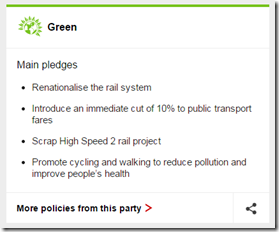This is a much awaited, fourth in my series from the May 2015 election, which considers the Green Party manifesto, their transport commitments and in particular what they have to say about smart ticketing.
Green transport policy
As you might imagine, the Green Party has got quite a lot to say on transport policy. They commit five whole pages to transport policy within their manifesto and there are numerous mentions elsewhere in the document as well.
Green smart ticketing ?
As the Greens have so much to say on transport, let’s get the relatively minor question of smart ticketing out of the way … The Greens continue the trend and make specific mentions of smart and integrated ticketing in their manifesto.
|
Affordable public transport Page 65 of the Green Party General Election Manifesto 2015 |
The pledge is also repeated under the heading of “Towns and Cities for people”:
|
Towns and cities for people • Make public transport more convenient by integrating ticketing with smart regional ticketing systems such as the London Oyster card. Page 66 of the Green Party General Election Manifesto 2015 |
I note the careful choice of wording:
- to mention both smart and integrated ticketing,
- to use the term “regional smart payment schemes, with integrated ticketing” –
- The Greens are the first party to draw a distinction between payment and ticketing. (Does it really matter if we have to show a different “token” on one mode of transport than another, as long as it is clearly explained what we need to show to the driver or present at the gateline, for each leg of the journey. However, much more important to getting people out of their cars, is having the confidence that I can purchase a through-ticket all the way to my end destination. As Rory Sutherland described it’s getting people out of the habit of jumping into the car on their driveway, or overcoming the fear factor of “what happens at the other end”, when I arrive an an unknown destination ? I shouldn’t have to go to each individual operator for each leg of my journey and piece it altogether myself. Mental note to self: I must write a longer blog-post on this topic.)
- Like the other parties, the Greens talk about “regional” ticketing schemes i.e. not mentioning specific modes of transport or operators; and, of course,
- to reference back to what the public know i.e. the “London Oyster card”.
One fine day in April 2019
The Greens end their manifesto with a vision titled “One fine day in April 2019”, which steps through the day in the life of someone living in a country that voted for the Green party. The scenario starts:
|
One fine day in April 2019: You leave work at 5 pm on the dot, and check the bus stop’s electronic display – your bus home is due in 3 minutes. It glides to a stop, electric motor whirring quietly, and you beep on with your smartcard. The buses are not-for-profit now, and cheaper than they were four years ago. |
Whilst the selection of smart ticketing technology might not be the most revolutionary, perhaps the most challenging part of the vision is the timetable that the Greens have set for themselves. They are quite specific that this Vision will be delivered in April 2019, which isn’t that far away. They probably wouldn’t, but the vision isn’t caveated with: “If you travel on the right mode of transport, in the right part of the country” or “If you travel with the right operator”. I read this as a nation-wide vision for the country.
The visionary scenario continues and, in my view, becomes more optimistic in what can be achieved within five years; but perhaps we do have to “think big” if we are going to meet the challenges of really becoming a green society.
Maybe not so unreasonable (see my previous post on Bob Geldof and the Power of Unreasonable People) for the train tickets to cost “less than you would have expected”, but how likely is a local line that gets you practically to the campsite gate ?
Now, to the big points …
The BBC summarises their Transport Policy under four main headings: To re-nationalise the rail system, to introduce an immediate cut of 10% on public transport fares and to promote cycling and walking. As described above, in order to fund the policies and in order to avoid ‘air-time’ going on discussion of what they view as “vanity projects”, the Greens propose the scrapping of HS2 rail and extra runways and a re-focussing on local transport and making sure it is accessible for everybody.
There is definitely some meat in these topics. I guess one of the key questions is whether the Green Party could get themselves to the position of being a “king-maker” such that they could have sufficient influence on the policies of a coalition. And if they did, which would they pick out as their headline policies to take a stand on ?
There were two other snippets that I noticed in their manifesto that I thought were worth drawing out, one more surprising than the other:
- a commitment to open transport data ,and
- a policy to introduce road-pricing more widely.
Open Data
|
Oppose the privatisation of data held by the government that should be open to all, such as the Postcode Address File, or by companies providing public services, such as data on the progress of buses that can be used by Smartphone apps to predict waiting times. |
Road pricing
|
Towns and cities for people • Introduce road-pricing schemes such as the London congestion charge and road-user tolls for heavy lorries. • … Page 66 of the Green Party General Election Manifesto 2015 |

